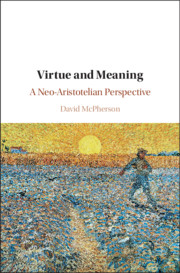Book contents
- Virtue and Meaning
- Virtue and Meaning
- Copyright page
- Dedication
- Contents
- Acknowledgments
- Introduction: Toward Re-Enchantment
- Chapter 1 The Human Form of Life
- Chapter 2 Virtue, Happiness, and Meaning
- Chapter 3 Other-Regarding Concern
- Chapter 4 Cosmic Outlooks
- Chapter 5 Homo Religiosus
- Conclusion
- References
- Index
Chapter 3 - Other-Regarding Concern
Published online by Cambridge University Press: 09 January 2020
- Virtue and Meaning
- Virtue and Meaning
- Copyright page
- Dedication
- Contents
- Acknowledgments
- Introduction: Toward Re-Enchantment
- Chapter 1 The Human Form of Life
- Chapter 2 Virtue, Happiness, and Meaning
- Chapter 3 Other-Regarding Concern
- Chapter 4 Cosmic Outlooks
- Chapter 5 Homo Religiosus
- Conclusion
- References
- Index
Summary
I discuss how strong evaluative meaning makes an important difference for a proper account of the nature and extent of the demands for other-regarding concern. The dominant neo-Aristotelian approach has regarded the other-regarding virtues (e.g., justice, generosity, honesty, etc.) as virtues primarily because of their role in promoting the “good functioning of our social group,” which is seen as important for achieving our own flourishing as rational social animals. I focus especially on MacIntyre’s account of other-regarding concern as rooted in social networks of giving and receiving in his book Dependent Rational Animals. What is overlooked in the dominant approach is the strong evaluative sense of human beings as being worthy of our concern for their own sake due to their inherent dignity (or sanctity) and that a normatively higher, nobler, more meaningful mode of life can be achieved through such concern. I seek to show the difference this makes for ensuring that we regard all human beings as fully amongst us, for making sense of and defending moral absolutes, and for properly responding to the demands of universal and particular concern.
Keywords
- Type
- Chapter
- Information
- Virtue and MeaningA Neo-Aristotelian Perspective, pp. 76 - 114Publisher: Cambridge University PressPrint publication year: 2020

